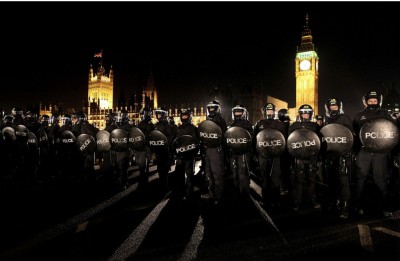UK Police Want to Secretly Arrest Journalists Who Report on Snowden’s NSA Leaks

London — Metropolitan Police claim an investigation into the possibility of prosecuting journalists for their role in publishing secrets leaked by Edward Snowden will be kept secret. The revelation thatinformation won’t be disclosed due to a “possibility of increased threat ofterrorist activity” follows the relentless demands for information from journalists at The Intercept.
In 2013, Brazilian student David Miranda—partner of Guardian journalist Glenn Greenwald, who was then at the centre of the Guardian’s disclosures about the National Security Agency—was detained for 9-hours at Heathrow Airport while transporting a batch of encrypted Snowden documents to assist Greenwald’s reporting on the files.
Miranda was returning from Germany where he had met filmmaker Glenn Greenwald, who was involved in breaking revelations leaked by Edward Snowden. The leaks exposed the extent of mass online surveillance carried out by the U.S. National Security Agency and the U.K.’s monitoring operation, GCHQ.
After the airport seizure of digital material including a laptop, cell-phone, and memory sticks, the London Metropolitan Police opened a criminal investigation and posted a statement on its website, describing the confiscated material as “highly sensitive” and claiming the disclosure of it“could put lives at risk.”
At the time, in London’s High Court, lawyer Jonathan Laidlaw said, “The disclosure of (the material) would be gravely injurious to public safety and thus the police have now initiated a criminal investigation.” He added, “…there is an absolutely compelling reason to permit this investigation to continue.”
Cressida Dick, previous assistant commissioner at Scotland Yard, alsoconfirmed at the time that detectives were examining whether journalists had committed offences. She said officers were looking at potential breaches of a specific anti-terrorism law that makes it unlawful to communicate information about British intelligence agents.
And then…silence.
According to journalist Ryan Gallagher, the London Metropolitan Police Force has repeatedly refused to release information on the investigation. Gallagher’s persistent pursuit of information on the status of the investigation, using the Freedom Of Information Act, including data on the costs and number of officers involved, fell on deaf ears—until he received a partial response on July 21.
In its response to his request, the Metropolitan Police finally put its cards on the table “…to confirm or deny whether we hold any information concerning any current or previous investigations into the alleged actions of Edward Snowden could potentially be misused proving detrimental to national security.”
The response then lists a series of national security exemptions to the Freedom of Information Act and justifies why details on the investigation will not be released.
“In this current environment, where there is a possibility of increased threat of terrorist activity, providing any details even to confirm or deny that any information exists could assist any group or persons who wish to cause harm to the people of the nation which would undermine the safeguarding of national security.”
Despite a remarkable lack of interest from the press on the issue and claims from the Metropolitan Police that it“would not be in the public interest” to reveal information on the investigation, The Intercept is not giving up without a fight. Believing it is definitely in the interests of those spied upon to know the details of the spying, the news organization has filed a complaint with the body that enforces Freedom Of Information laws and is challenging the Metropolitan Police’s ongoing refusal to release information.
This article (UK Police Want to Secretly Arrest Journalists Who Report on Snowden’s NSA Leaks) is free and open source. You have permission to republish this article under a Creative Commons license with attribution to Michaela Whittonand theAntiMedia.org. Anti-Media Radio airs weeknights at 11pm Eastern/8pm Pacific. If you spot a typo, email[email protected].
Michaela Whitton joined Anti-Media as its first journalist abroad in May of 2015. Her topics of interest include human rights, conflict, the Middle East, Palestine, and Israel. Born and residing in the United Kingdom, she is also a photographer. Learn more about Whitton here!

